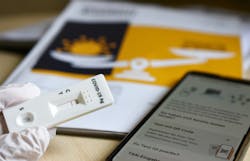The Centers for Disease Control and Prevention (CDC), in collaboration with the National Institutes of Health (NIH), has launched a community COVID-19 self-testing initiative, according to a news release from the CDC.
Called "Say Yes! COVID Test," the initiative is starting in Pitt County, NC, and will be launched soon in Chattanooga, TN.
As many as 160,000 residents across the two communities will have access to free, rapid antigen tests that they can administer themselves three times a week for one month. NIH will provide the tests and evaluate the effectiveness of the initiative, which aims to determine if frequent self-administered COVID-19 testing helps residents reduce community transmission of SARS-CoV-2.
Participants will be able to order their test kits online for home delivery or pick them up at a local distribution site. A free online tool that also is available as a phone app provides testing instructions, information to help understand test results and text message reminders about testing.
Participants in the "Say Yes! COVID Test" initiative will also have the option to volunteer in an NIH-supported research study that will collect additional data through surveys. The survey questions are designed to determine whether frequent self-administered testing has made a difference in behavior, knowledge on preventing spread of the virus, and thoughts about COVID-19 vaccination.
Researchers at NIH-supported University of North Carolina at Chapel Hill, and Duke University and the Duke Clinical Research Institute will work with the CDC and NIH to use publicly available COVID-19 case surveillance data on test positivity rates, COVID-19-related illness, and hospitalizations and measurements of viral particles in sewage wastewater to evaluate viral transmission in the community. At the same time, publicly available data will be reviewed from other communities of similar size that have not received widespread self-administered tests to evaluate the impact of frequent self-administered testing.

